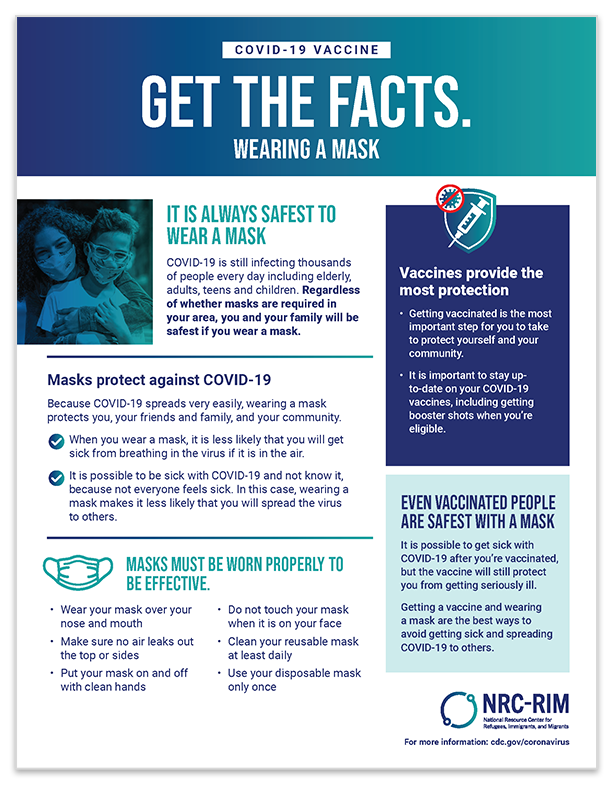
Whether you have been vaccinated or not, it's safest to wear a mask. While getting vaccinated is the most important step for you to take to protect yourself and your community, wearing a mask provides even more protection. Masks protect you and people around you from getting COVID-19.
Why is it important to wear a mask?
Masks protect people around you from COVID-19. It is possible to be sick with COVID-19 and not know it, because not everyone feels sick. In this case, wearing a mask makes it less likely that you will spread the virus to others.
Masks also protect you from COVID-19. When you wear a mask, it is less likely that you will get sick from breathing in the virus if it is in the air.
There are no mask requirements where I live. Should I still be wearing one?
COVID-19 is still infecting thousands of people every day including elderly, adults, teens and children. Regardless of whether masks are required in your area, you and your family will be safest if you wear a mask.
I am fully vaccinated. Why do I still need to wear a mask?
When people to get COVID-19 after they are vaccinated, scientists call it a “breakthrough infection.” Even if you are up-to-date on your COVID-19 vaccines, you can catch COVID-19 and may not know it because you may not feel sick at all. This makes it more likely that you could spread it to family and friends.
When you wear a mask, it is less likely you spread COVID-19, which protects:
- People who are not vaccinated for whatever reason, including young children who cannot get the vaccine yet.
- People in whom the vaccine can wear off faster, like older people.
- People with certain health conditions like cancer or organ transplants, because the vaccine doesn’t work well in some people with serious conditions.
While staying up-to-date with your COVID-19 vaccines is the most important step for you to take to protect yourself and your community, wearing a mask provides even more protection.
I am not vaccinated. Why should I get a vaccine if I still have to wear a mask?
The best way to protect yourself from getting sick and spreading COVID-19 to others is to stay up-to-date with your COVID-19 vaccines. If you are up-to-date, you are less likely to get infected with COVID-19, get dangerously ill or die, and spread it to loved ones. Being up-to-date means getting both doses of a two-shot vaccine, and then getting a booster shot when you are eligible.
Because COVID-19 spreads very easily, wearing a mask provides even more protection for you, your friends and family, and your community. Getting a vaccine and wearing a mask are the best ways to avoid getting sick and spreading COVID-19 to others.
What is the safest way to wear a mask?
Masks must be worn properly to be effective. That means wearing it over your nose and mouth and making sure air does not leak out the top or sides of the mask.
Wash your hands or use hand sanitizer before putting on your mask and after taking it off. Do not touch your mask when you are wearing it.
If you wear a disposable mask, throw it away after wearing it once.
If you wear a reusable mask, make sure it has at least two layers of washable fabric. You should clean your reusable masks at least once per day with laundry soap and water.
What are variants and what do they have to do with masks?
Viruses are always changing to try to outsmart our bodies and to assure it can survive through spreading to new people. When a big change happens, scientists call it a new variant. Some variants disappear and never cause harm, while others can make a virus easier to spread, harder to treat, and/or more deadly. When variants occur, scientists and experts monitor them closely. Many variants of the COVID-19 virus have already been discovered and are being monitored. Certain variants are more successful and present a greater danger than others, like Delta and Omicron. These are called variants of concern.
Because some variants are easier to spread, wearing a mask provides extra protection for you, your family and friends, and your community.
